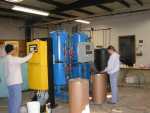Water treatment tests showing success

Cities across the country are experiencing water contamination. Some have high nitrate content, some have high uranium and some have high arsenic levels, but the city of McCook is experiencing a unique problem -- its water is high in all three.
That situation has presented a special problem to engineers developing the city's water treatment system, but a new test pilot study is proving to be effective in removing all three contaminants.
The study is being conducted at the city's water shop on South Street. The mini- treatment plant was developed specifically for the city of McCook.
It is the first the first of its kind to remove all three contaminants with a single pass. The unit includes a "cation" filter to remove the calcium deposits (hardness) from the water, then that filtered water is then passed through the "anion" unit to remove the contaminants.
Each unit contains 10 cubic feet of resin. Twenty gallons per minute pass through the mini-units, which measure about 28 inches in diameter. The unit includes a nitrate analyzer that gives a reading every two minutes, showing the amount of nitrates in the untreated and the final nitrate reading after treatment.
The pilot study is proving to be successful, said Lauren Scott, chemical engineer for Jacobson Helgoth. The nitrates in McCook's untreated water are running at about 10.2 ppm.
After passing through the test treatment plant, that level drops to about 0.1 ppm. Daily tests of the treated water are being sent to Midwest Laboratories, a state certified testing facility. To date, the testing has proven that the pilot study is successful when it comes to removing nitrates and arsenic. The tests for uranium will not be completed before the end of the pilot study, but engineers are confident that the uranium level will fall well below federally mandated levels.
If the study proves to be successful, engineers will begin developing full-size equipment for the city. The full-size unit will include 12 large units measuring about 11 feet in diameter. Engineers plan to take the treated water and blend it with 50 percent of untreated water, bringing the nitrate levels to around 5-6 ppm.
Scott and her associate Jeremy Beard, civil engineer, will be testing the blending theory next week.
The results of the study will be presented to the McCook City Council after all the information has been analyzed.
